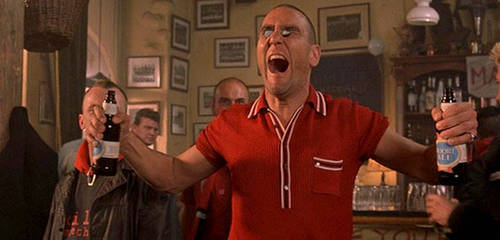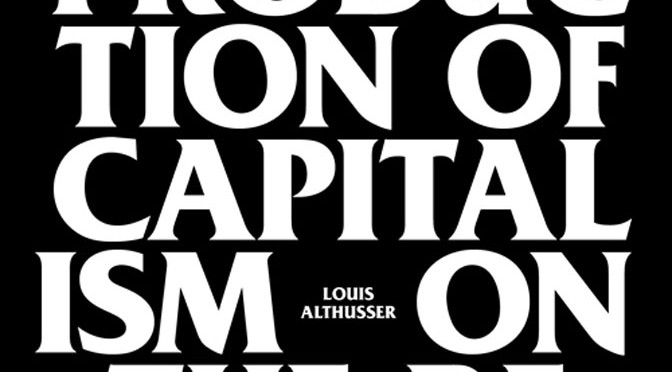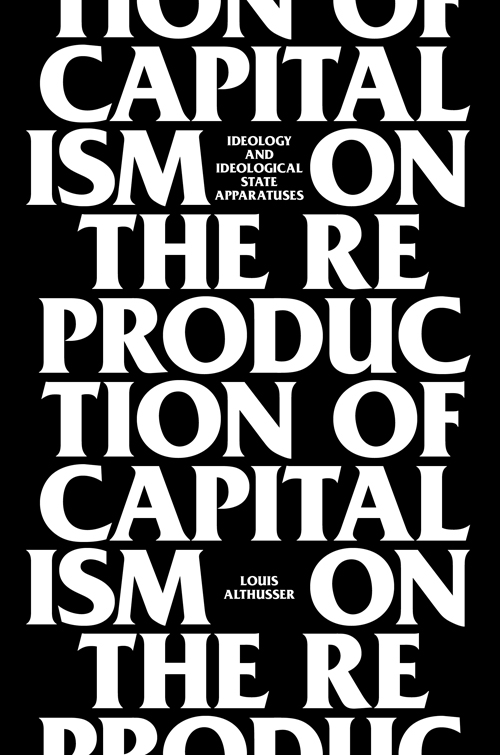You’ve probably heard the term “ideological state apparatus” slung around by hip Marxists a few times. And, to some extent, you probably “got” it. Isn’t it, after all, just a theoretical version of that Pink Floyd song? But besides your preconceived notions about fighting the system, where does the term actually come from?
Some of you may know the original essay “Ideology and Ideological State Apparatuses,” which has been around forever (or over 30 years, – depends on your frame of reference). That essay develops the ideological state apparatus as an innovation to Marxist thought. But it is actually just a trimmed down and gutted version of a much larger work that Althusser wrote, now in English for the first time.
The full English work is called “On the Reproduction of Capitalism,” and we’re happy to present our wildly irresponsible guide to the nitty-gritty of Althusserian Marxism.
Let’s define some boring terms first.
For capitalism to survive, it must constantly maintain its “mode of production.” But, if we aren’t specific in the definition of a “mode of production,” we’re already up shit’s creek.
Althusser says that the mode of production is the unity between the productive forces and the relations of production. But you’re probably confused, because I defined one term with two equally confusing terms.
The productive forces are the shit we use to make other shit. Technically speaking, it’s the means of production combined with labor power. Except it’s spelled “labour,” because the translator hates America. The relations of production are how we set forth those productive forces in motion. Our society has plenty of factories and workers laying around, but what makes them work? Is it your allegiance to the one true king that makes you wake up every day and go to work, or your depressing paycheck from your boss?
For Althusser, the mode of production, and more specifically the relations of production, are “determinant in the last instance.” They control everything in society. They are, in effect, the helicopter mom to society’s childish whims.
Now, given that our current society’s relation of production is capitalism, specifically capitalist exploitation, we can thus blame everything terrible in the world on capitalism.
That shitty music on the radio?
Capitalism did it.
Those shitty ideas you read in some shitty books?
Capitalism did it.
Arrested Development’s premature cancellation?
Capitalism did it.
Which brings us to another Marxist distinction: base and superstructure. Marxists, albeit in different ways, conceive of society as divided into two parts – base and superstructure. The base is the foundation of society and consists of the relations of production (wage labor, capitalist exploitation). The superstructure consists of laws, the state and ideology (the little lies capitalism tells us). If society were a house, the economic base is the foundation, while the superstructure is the roof on top. Pull away the foundation, and the superstructure crumbles.
So we’re brought to the question: how does this shit keep being shitty?
Answer: a bunch of bullshit.
There has always been questions of capitalism’s reproduction in Marxism. But Marx himself was concerned with how capitalism reproduces the material conditions for its existence. In other words, how does it keep the machines running, raw materials flowing, and workers ready to exploit? For Marx, capitalism keeps its workers alive, and hence ready to exploit, with wages.
Somewhere along the road, factory owners figured out they needed to not only pay their workers enough to eat, but get drunk enough to forget their terrible existence. Marx, Althusser notes, argues that English workers needed enough wages for beer, and French workers needed enough for wine.

But Althusser’s genius was discovering that workers needed more than grub, booze and some extra cash to raise a family to reproduce the conditions of capitalism.
There is also law, the state, and ,Althusser’s most novel idea, “ideological state apparatuses.”
Click below to continue reading.


